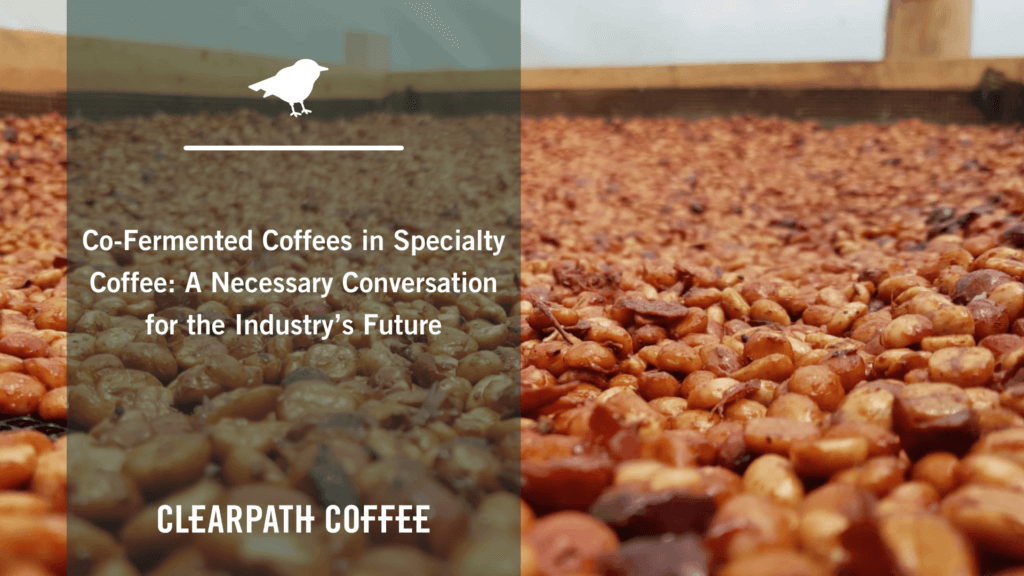At ClearPath Coffee, we understand that co-fermented coffees spark strong opinions. We recognize that this is a controversial and, at times, uncomfortable topic, especially for those who have dedicated years to perfecting classic high-quality profiles. Our intention is not to disregard or diminish the incredible work of thousands of producers and roasters committed to washed, natural, or honey-processed coffees. However, we believe this conversation is necessary because co-fermented coffees represent shifts that directly impact the future of our industry.
We want to share our perspective—not to impose an absolute truth, but to invite reflection on what these coffees represent and the opportunities they may bring. We ask you to approach this with an open mind and curiosity, the same values that unite us as coffee professionals.
We, too, have felt this discomfort
At ClearPath, we work with over 70 coffee producers across Colombia. We have seen firsthand the effort, dedication, and passion behind exceptional washed, natural, and honey-processed coffees. These coffees carry unique stories, processes refined over years of experience, and clean profiles that reflect their terroir.
And yet, we’ve also witnessed the market—particularly in recent years—shift significant attention toward co-fermented coffees.
It isn’t always easy. Like many purists, we also find ourselves frustrated at times. We love a well-crafted washed coffee, and we continue to promote them. But the reality is undeniable: demand for co-fermented coffees is growing at a really fast pace.
But what opportunities can this trend bring?
Rather than debating whether this shift is good or bad, we believe the key question is: what opportunities can arise from it?
Here are some of the potential pathways we see:
- Learning and Evolution at the Farm Level
The growing popularity of co-fermented coffees has sparked curiosity and a desire to learn among producers. More and more farmers are exploring fermentation techniques, experimenting with controlled microbial activity, and deepening their technical knowledge. This learning process is not just a passing trend—it is building expertise that could, in the future, enhance even traditional processing methods, raising overall coffee quality in Colombia.
- Expanding the Specialty Coffee Consumer Base
The bold, expressive sensory profiles of co-fermented coffees attract consumers who might not otherwise engage with specialty coffee. In many cases, these coffees serve as an entry point, giving us a unique opportunity: to capture the interest of new, younger, and more curious audiences and gradually educate them. Once they are engaged—initially through co-fermented coffees—we can guide them toward a deeper appreciation of coffee’s origins, processes, and the vast range of high-quality flavors it offers.
- A Call for Professional Responsibility
The market is making its choice. As industry professionals and leaders, we have a responsibility not to ignore this reality. Instead of further polarizing the conversation, we have an opportunity to bridge tradition and innovation. If we harness the attention that co-fermented coffees generate, we can use it as a tool to educate, inspire, and guide new consumers—helping them develop a more sophisticated palate and a deeper understanding of coffee as a whole.
In Conclusion: It’s Not Black or White
The discussion around co-fermented coffees is not about choosing sides—good versus bad, right versus wrong. It is about recognizing that the industry is evolving and that we all have a role in shaping its future.
At ClearPath Coffee, we believe in balance: championing and preserving traditionally processed high-quality coffees while also leveraging emerging trends to attract new audiences and ensure specialty coffee remains relevant and sustainable for generations to come.
Let’s talk. We are open to all perspectives because only through honest discussion can we build a stronger future for our industry.

I’m extremely inspired together with your writing talents and also
with the layout on your weblog. Is that this a paid theme or did you modify it yourself?
Either way stay up the excellent high quality writing, it’s rare
to look a nice blog like this one nowadays. TikTok Algorithm!